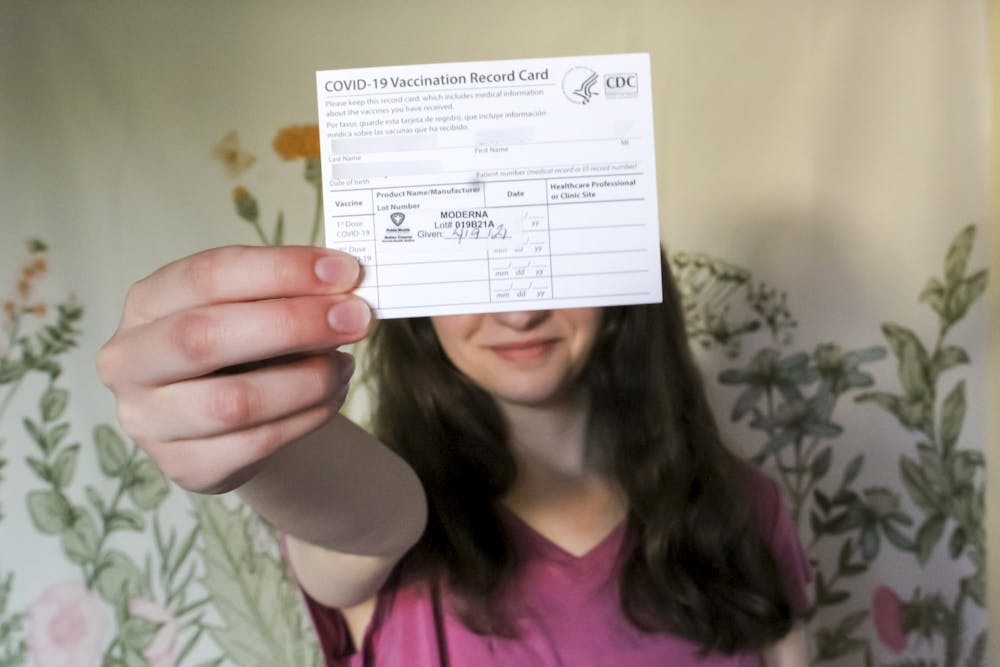The process of receiving a COVID-19 vaccine is a relatively clear process. There are signs pointing to vaccine sites, volunteers waiting to register patients, and socially distanced chairs to wait in before getting a dose.
What’s not so clear is what to do with the vaccination card one gets after receiving it.
People who get the COVID-19 vaccine are urged to hold onto their vaccination cards, although the uses of the card for anything other than record keeping and verification for the second dose of the vaccine are unclear.
While some restaurants like Krispy Kreme are offering discounts and deals to customers with proof of vaccination, many other institutions have not implemented any use for the cards.
However, at Miami University, the cards do have one important use.
Carole Johnson, associate director of news and communications at Miami, wrote in an email to The Miami Student that the cards help determine whether or not students still need to participate in COVID-19 testing or get put into quarantine.
“Students who are fully vaccinated should use the MedProctor Portal to share their documentation with the university,” Johnson wrote in an email to The Student. “Doing so will allow their test result and vaccination record to be shared with the Miami COVID-19 testing and response teams, as needed, in order to exempt you from testing, isolation or quarantine.”
While the university currently doesn’t require the cards for anything else, Johnson stressed that students should hold onto their cards.
“Students should keep these cards along with other important health records; it is also a good idea to take photos of the cards,” she wrote.
One such student keeping track of her card is Olivia Thomas, a first-year double majoring in Spanish and international studies. She sees the card as a way to show that she is vaccinated but not something that she would use in everyday life.
“[The card] is important to me, but I don’t carry it around like my school ID or my driver’s license,” Thomas said. “It’s more that I have the vaccine, and the card is proof of that.”
While seeing the value of having proof of vaccination, Thomas did take some issue with the shape of the cards themselves.
Enjoy what you're reading?
Signup for our newsletter
“They’re not perfectly wallet sized, so it’s a bit of a downside — I use the phone wallet, so the fact that it doesn't fit in there is a bit inconvenient,” Thomas said. “The card is buried under my desk right now, but I know where it is.”
While students like Thomas were able to work out an easy solution to the size of the vaccine cards, others were not as lucky.
Sami Nickell is a junior nursing major at Miami’s Hamilton campus who misplaced her card after getting the vaccine.
“I thought I had stuck [the card] in my wallet, but when I went back to look, it wasn’t in there; I looked everywhere and couldn’t find it,” Nickell said. “I was very worried because I thought that I wasn’t going to be able to get another card, and that was going to prevent me from getting a second dose of the vaccine.”
Fortunately, Nickell was able to get a new card when she received her second dose of the vaccine. However, she has concerns about making vaccine cards requirements for citizens to go certain places in the future.
“I would be worried about making vaccine cards requirements for going places because I know how easy it is to lose them,” she said. “I wish [the vaccine cards] were something electronic so you didn’t have the ability to lose them — you could just pull it up on your phone whenever.”
While struggling to manage vaccine cards may be new for many students, these kinds of cards have been around for a lot longer than this spring.
Kendall Leser, director of the public health program at Miami explained that vaccine cards were more standard than one might think.
“Receiving documentation that you have received a vaccine is standard practice and not just used for COVID-19 vaccines,” Leser said. “When looking through my baby stuff, I came across a piece of paper that listed all of the vaccines that I had received as a child over 30 years ago. Vaccine cards or documentation of receiving shots have been around long before the COVID-19 pandemic.”
However, Leser did welcome the idea of businesses potentially letting customers use vaccine cards for deals and discounts.
“The literature suggests that an effective method for changing behavior is to incentivize the behavior you seek to change — lower car insurance rates for good driving and paying people to quit smoking are examples of incentives used in the past to change a behavior,” Leser said. “In this case, the behavior that the field of public health is seeking to change is having individuals receive their COVID-19 vaccine; organizations offering deals, discounts or coupons to people with a vaccine card is a way to incentivize people to become vaccinated.”




